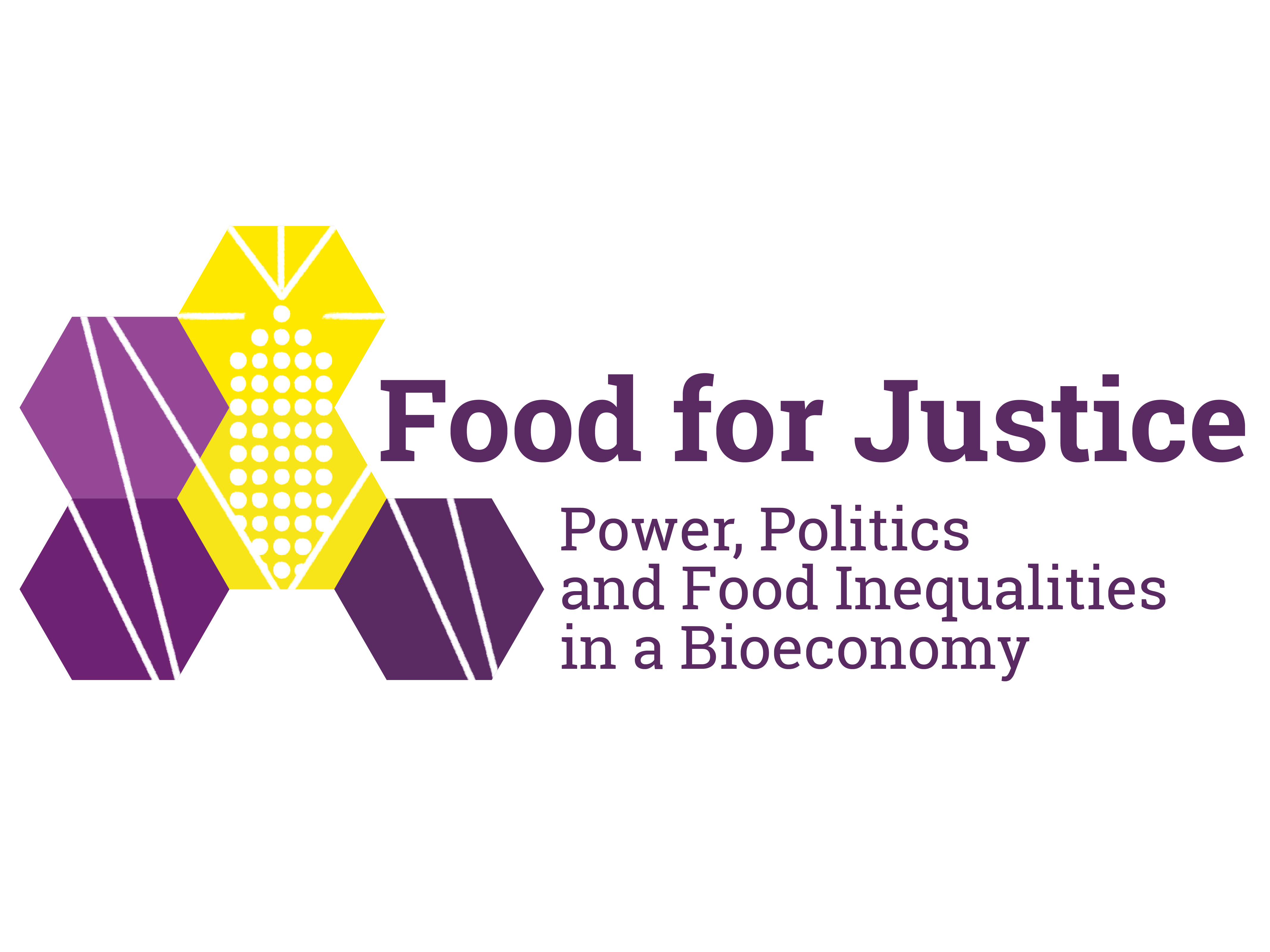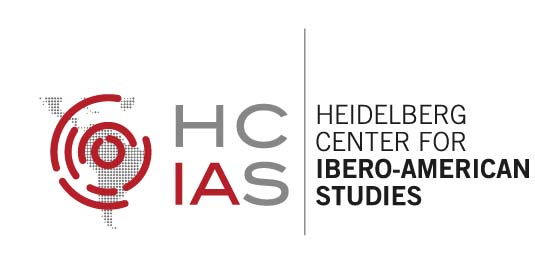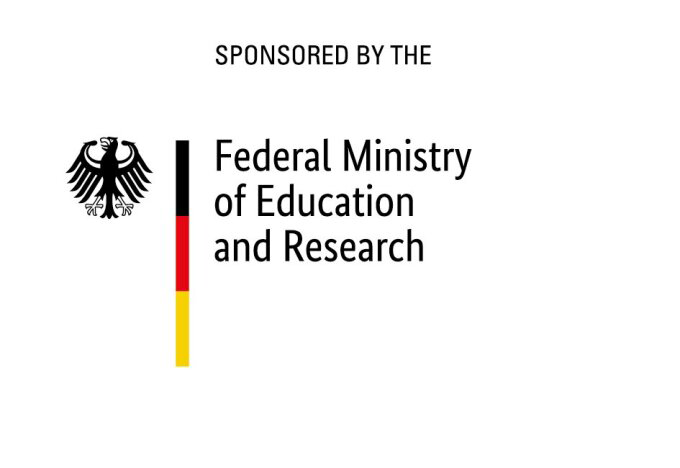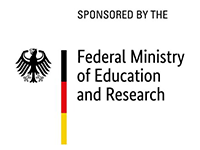Archives
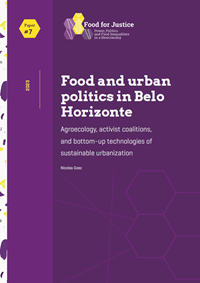
Vol. 7 (2023)
Working Paper 7: Food and urban politics in Belo Horizonte: agroecology, activist coalitions,
and bottom-up technologies of sustainable urbanization
In this Working Paper, I aim to contribute to the emerging debate between food and urban studies by bringing to the fore the socio-political dimension of the food system and its urban context. Guided by the general research questions of the project “Food for Justice: Power, Politics, and Food Inequalities in a Bioeconomy”, this research is embedded in a case study on food politics in the city of Belo Horizonte.
It deals with the social innovations of the agroecological and housing movements of the city and the dwellers of Izidora, inhabitants of a so-called “informal settlement”, whose engagement in the fight for housing and the right to the city has yielded remarkable achievements in building activist coalitions and re-signifying marginal urban spaces. Drawing on digital-ethnographic fieldwork I conducted between January
and December 2020, I analyze the context, use, and reach of these social innovations as an instrument to transform urban development in the peripheries of Belo Horizonte.
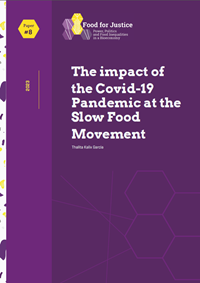
Vol. 8 (2023)
Working Paper 8: The impact of the Covid-19 Pandemic at the Slow Food Movement
The corona virus outburst was declared a global pandemic in March 2020, making many countries to go on lockdown in order to try to restrain it and avoid or dimmish the overwhelming of national health systems. As work and studies went online and social distancing became a safety rule, social movements also had to adapt themselves. Furthermore, food movements gained more relevance as one of the
first concerns was to keep the food production and distribution worldwide despite the shutdowns. This paper aims to analyse the impacts of the Covid-19 pandemic in the Slow Food movement, how it changed the movement organization, agenda, and actions. It is based on empirical research in two countries: Brazil and Germany and it looks at three moments of the pandemic, from its first impact in 2020 till the adaptations and continuities in 2021 and 2022. This work relies on an on-site and virtual ethnography and is part of a broader investigation on the movement on both countries.
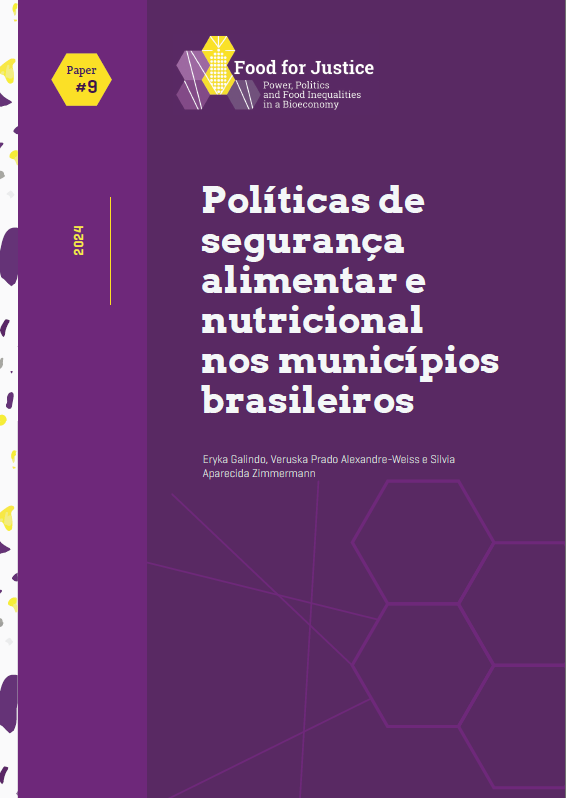
Vol. 9 (2024)
Working Paper 9: Políticas de segurança alimentar e nutricional nos municípios brasileiros
Esta publicação registra ideias centrais que emergiram em torno da atividade autogestionada “Política de Segurança alimentar e nutricional no âmbito municipal: contexto e oportunidades”, realizada de forma virtual no V Encontro Nacional de Pesquisa em Soberania e Segurança Alimentar e Nutricional (V ENPSSAN, 2022). Garantir o Direito Humano à Alimentação Adequada e o alcance das políticas públicas de Segurança Alimentar e Nutricional (SAN) passam, necessariamente, por reconhecer o papel central dos municípios na execução de ações e construção de diálogos locais, de forma integrada com os demais poderes públicos e áreas governamentais, como propõe o Sistema Nacional de SAN. No debate emergiram reflexões sobre monitoramento da segurança/insegurança alimentar populacional, definições e conceitos associados às políticas públicas de SAN, relatos de experiências municipais, bem como oportunidades para a retomada e fortalecimento das políticas de SAN nos municípios. Foram identificados oito potenciais enfoques para contribuir com o campo de pesquisas sobre políticas públicas de SAN no contexto municipal: governança participativa; diversidade territorial e a relação rural-urbano; institucionalidades; atuação da sociedade civil; intersetorialidade; escalas e distintas espacialidades; interface com a agenda socioecológica; e capacidades estatais. Por fim, identificou-se também temas e alguns desafios para a efetividade das políticas de SAN municipais. Este documento traz contribuições coletivas às distintas janelas de oportunidades que atualmente se encontram em frente aos diversos atores sociais envolvidos nas políticas de SAN municipais. Neste sentido, destacamos a retomada da agenda pública guiada e fortalecida pelo Governo Federal (a partir de 2023), a retomada do Consea nacional e a ocorrência, em 2024, de eleições municipais.
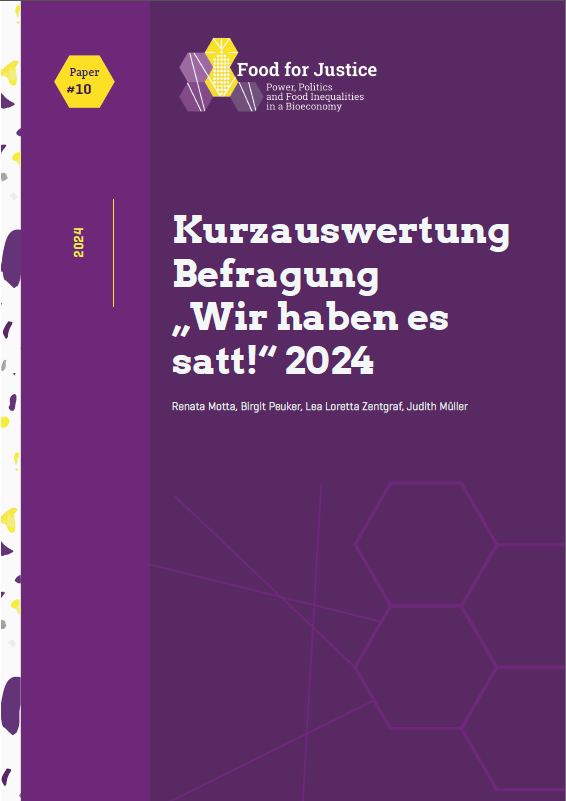
Vol. 10 (2024)
Working Paper 10: Kurzauswertung Befragung „Wir haben es satt!“ 2024
Seit 2011 findet jährlich zum Auftakt der Agrarmesse Grüne Woche in Berlin die Demonstration „Wir haben es satt!“ des Bündnisses Meine Landwirtschaft statt. Das Bündnis setzt sich für eine nachhaltige und faire Landwirtschaft und Lebensmittelproduktion ein und fordert die Agrar- und Ernährungswende. Die Fallstudie „Wir haben es satt!“ ist Teil des Projektes der BMBF-Nachwuchsgruppe Food for Justice: Food for Justice: Power, Politics and Food Inequalities in a Bioeconomy am Heidelberg Centrum für Ibero-Amerika-Studien (HCIAS) der Universität Heidelberg. Das Projekt untersucht verschiedene Achsen der Ungleichheiten im Bereich der Ernährung in unterschiedlichen Maßstäben und räumlichen Gegebenheiten sowie deren Dynamiken der Reproduktion und des Wandels in der Ernährungspolitik. Die Fallstudie „Wir haben es satt!“ untersucht die zentralen Gerechtigkeitsforderungen, die Bürger*innen dazu mobilisieren, Ernährungsungleichheiten anzuprangern und alternative Ernährungspolitiken in verschiedenen Weltregionen zu fordern. Am 20. Januar 2024 haben Forscherinnen von Food for Justice mit Unterstützung freiwilliger Interviewenden eine Befragung mit Beteiligten der „Wir haben es satt!“-Demonstration durchgeführt. Die so gewonnenen Daten geben Aufschluss über die soziodemographische Zusammensetzung der Demonstrierenden, ihre Anliegen und politischen Haltungen sowie darüber, wie sie durch ihr eigenes Konsumverhalten und ihren Lebensstil eine zukunftsfähige Landwirtschaft unterstützen. In dieser Kurzzusammenfassung werden die Methodik sowie ausgewählte Ergebnisse der Befragung vorgestellt.
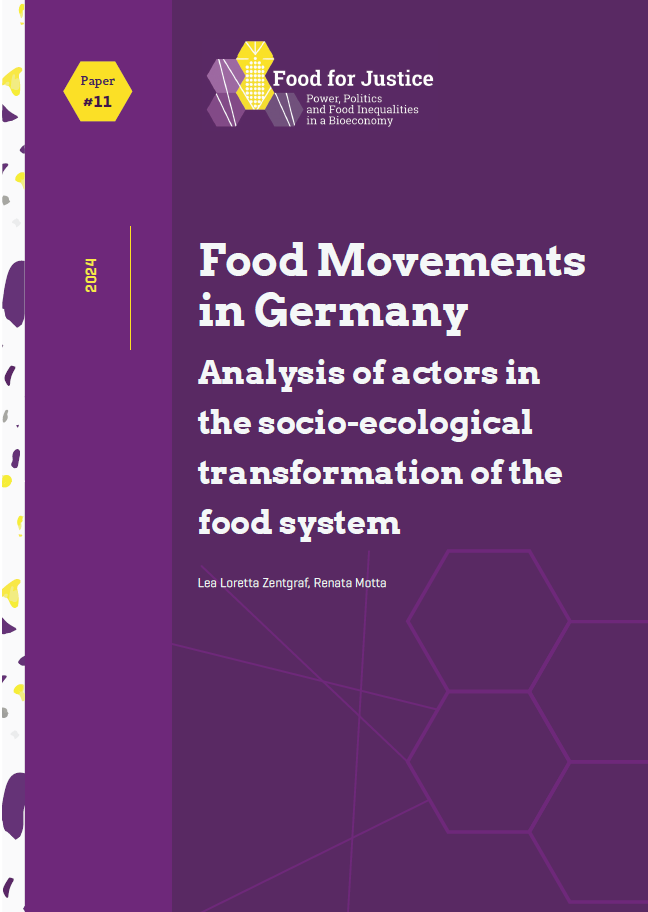
Vol. 11 (2024)
Working Paper 11: Food Movements in Germany. Analysis of actors in the socio-ecological transformation of the food system
Around the world, social movements are protesting against the corporate food regime (Friedmann & McMichael, 1989), denouncing the injustices associated with its structural dynamics of neoliberal capitalism, patriarchal domination, racism, coloniality, epistemic violence, and anthropocentric exploitation (Motta, 2021b; Holt Giménez & Shattuck, 2011; Holt-Gimenez & Patel, 2012). Many food movements are calling for a socio-ecological transformation and creating alternative forms to produce, share, prepare, consume and dispose of food, based on relations of care, solidarity and respect. In their heterogeneity, they provide a good analytical lens to explore the multiple and intersectional dimensions of food inequalities denounced and the directions of change desired by organized movements from civil society (Motta, 2021a). But which are the food movements that mobilize for a socio-ecological transformation of food politics in Germany? What are the main dimensions and intersections of inequalities addressed by them?
Based on an explorative mapping, this research identifies relevant food movements in Germany, their discourses and agendas. It takes as units of analysis food movements organizations with considerable collective actions and participation in social mobilization on a national scale during the last 5 years (2018-2023). Using an analytical framework elaborated in dialogue with theoretical and conceptual works on food movements, food inequalities, and dynamics of transformation in the food regime, the empirical data is presented along the categories: types of movements and activist discourses, time of emergence, juridical form, dimensions of food inequalities addressed, categories of intersectional inequalities considered, spatial locus of action (urban/rural), phases of the food system, sphere of social change most frequently targeted by the food movements. Based on the data, the dynamics of transformations are discussed.
Applying a qualitative and quantitative methodology which combined content analysis and coding, the research results in a mapping of the actors (Mayring & Fenzl, 2019; Saldaña, 2021). This working paper aims to give a first overview of food activism in Germany by assessing the actors in this field of social mobilisation and analysing their emancipatory potentials and limits.
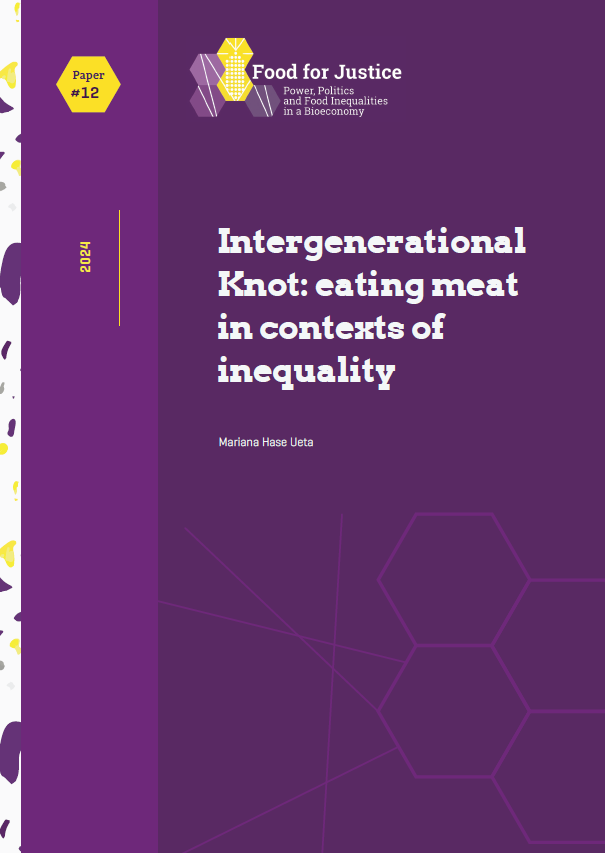
Vol. 12 (2024)
Working Paper 12: Intergenerational Knot: eating meat in contexts of inequality
The Anthropocene is not only a period of rapid environmental transformation but also a prolific moment of values changes. While the temporality dimensions of this phenomenon are a challenge to social sciences inquiry, it also presents a great opportunity for new methodologies to emerge. The intergenerational knot can be a useful methodological frame for understanding social change through the discussion of different values across different generations because, at the same time, it evidences differences and disagreement; it also carries the potential of mutually influencing and multiplying new food consumption practices. The present article focuses on intergenerational discussions through the case study of meat consumption. The young generation analyzed usually prioritizes environmental impact when choosing what to eat, however, other factors exert more significant influence on the family food consumption, such as their experiences of food deprivation, their views of what a “better life” consists, and their experience of social mobility. Therefore, first-hand ethnographic data was collected from university students who negotiated between personal values and family narratives around their household meat consumption in Campinas, São Paulo, Brazil. The intergenerational knot becomes a useful methodological frame to understand values change in social and environmental transformation processes in an inclusive way.
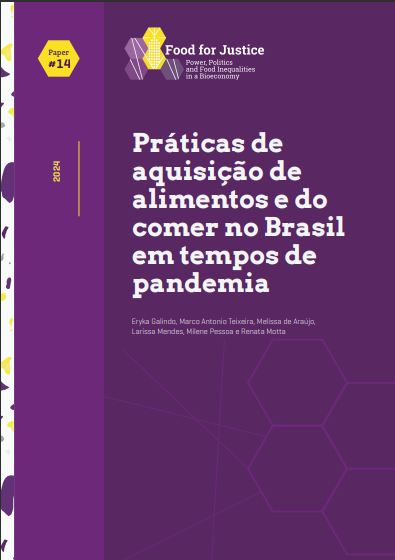
Vol. 14 (2024)
Working paper 14: Práticas de aquisição de alimentos e do comer no Brasil em tempos de pandemia
A pandemia da Covid-19 impactou as relações sociais, inclusive sobre as dinâmicas associadas à alimentação. O presente trabalho tem por objetivo identificar e analisar alterações nas práticas de aquisição de alimentos e do comer nos domicílios brasileiros no primeiro ano da pandemia. As análises se baseiam em dados de pesquisa representativa da opinião pública brasileira realizada por meio de coleta telefônica, entre os dias 21 de novembro e 19 de dezembro de 2020. Os resultados apontam para mudanças nas práticas de aquisição e do comer, com redução na frequência de sair de casa para comprar alimentos (68,9%) e para realizar refeições fora do domicílio, seja em estabelecimentos comerciais (74,4%) ou na casa de pessoas conhecidas (72,9%). Tais tendências de diminuição, justificadas pelas recomendações de distanciamento social como recurso para enfrentar a disseminação do vírus, são mais ou menos frequentes a depender dos marcadores socioeconômicos analisados, destacadamente, de sexo, raça ou cor, renda e situação de segurança alimentar e nutricional. Em relação às práticas de aquisição de alimentos, verifica-se que o ambiente alimentar digital passou a ser mais amplamente usado, sejapor meio da compra pela internet ou aplicativos de supermercados com entrega em domicílio (e-commerce) ou por meio de serviços de entrega de comida (delivery). Essa tendência foi observada tanto entre usuários já familiarizados com esses canais quanto entre novos adeptos. Em contrapartida, as feiras livres passaram a ser menos frequentadas pelas/os entrevistadas/os no primeiro ano da pandemia, com uma redução de frequência de 66,1% entre aqueles que utilizavam este serviço antes da pandemia. Essa mudança na prática de aquisição de alimentos pode representar, por um lado, maior exposição a alimentos ultraprocessados e refeições com perfil nutricional desfavorável, e, por outro, menor acesso a canais de comercialização de alimentos in natura e mais saudáveis. Finalmente, também significa uma maior tendência de compra de alimentos em grandes redes de supermercados e enfraquecimento de comerciantes de feiras livres. Considerando que momentos de crise, como a pandemia do Covid-19, podem tanto abrigar possibilidades abruptas de transformação nos sistemas alimentares, como fortalecer estruturas desiguais na produção, distribuição e consumo de alimentos, nossos dados apontam para a concentração de mais poder na cadeia de alimentos do sistema alimentar dominante e para exacerbação de desigualdades alimentares.
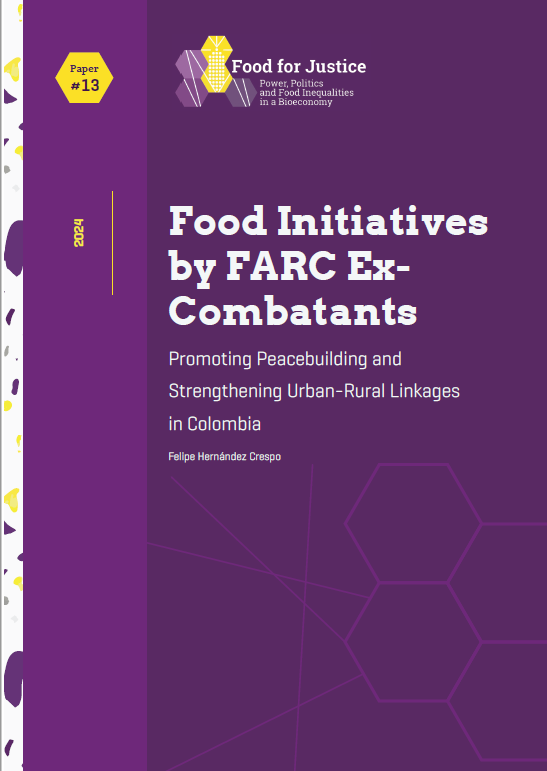
Vol. 13 (2024)
Working Paper 13: Food Initiatives by FARC Ex-Combatants. Promoting Peacebuilding and Strengthening Urban-Rural Linkages in Colombia
This working paper explores how food initiatives led by FARC ex-combatants contribute to peacebuilding and strengthen urban-rural linkages in Colombia. The study investigates the motivations behind ex-combatants' involvement in food initiatives, examines the connection between economic reincorporation and peacebuilding, and analyses how food acts as a bridge, materialising peace between urban and rural communities. Using a multi-method approach, this paper provides an overview of FARC's political trajectory, highlighting its shift from armed insurgency to peacebuilding actor. It further maps the landscape of ex-combatant food initiatives, analysing their scale, organisational structures, roles within the food system, and the intersectional categories that shape them. Findings indicate that ex-combatants often view food-related projects as integral to economic reincorporation, motivated by a blend of campesino heritage, former guerrilla identity, and established regional production knowledge and practices. This combination emphasises the importance of urban-rural linkages in shaping collective reincorporation processes. These food initiatives, grounded in principles of territorial peace, align with broader peacebuilding efforts, aiming to strengthen urban-rural connectivity. Ultimately, this research underscores the critical role of food systems in building lasting peace and highlights the voices and agency of ex-combatants in shaping their futures.

Vol. 15 (2025)
Working Paper 15: Solidarische Landwirtschaft (CSAs) in Germany: Drivers of change for a socio-ecological transformation of the food system? by Thomas Julián Poveda Ríos
In face of a multiple crisis within the current corporate food system, alternative models of food production and distribution have attracted increasing attention as catalysts for a socio-ecological transformation. Among these alternative models, Community Supported Agriculture (CSA) or as it is called in Germany, Solidarische Landwirtschaft (Solawi), emerges as a promising model for reshaping the socio-ecological landscape of food production and consumption. By shedding light on the transformative potentials and limitations of Solawis in the framework of a socio-ecological transformation of the local food system this paper aims to share knowledge and a further perspective on the question “How are we going to feed the world?”, the leading question of this working paper series. Through semi-structured expert interviews conducted in fall 2023 within two case studies around Berlin, the Apfeltraum Solawi and the Spörgelhof e.G. and a subsequent qualitative content analysis this work shares relevant insights across diverse domains of Solawi work, such as community-building, relationship with nature, fair wages and ecological farming practices.

Vol. 16 (2025)
Working Paper 16: Ernährungsungleichheiten und Solidarische Landwirtschaften - Ergebnisse einer Mitgliederbefragung in der Metropolregion Rhein-Neckar by Judith Müller
The following study investigates the membership composition of Community Supported Agriculture (CSA) initiatives in the Rhine-Neckar metropolitan region. It forms part of the broader BMBF-funded research project Food for Justice (2019–2025), which addresses inequalities and social movements in the agri-food sector in Germany and Brazil. CSAs are considered sites of socio-ecological transformation in agriculture; however, as existing studies have shown, they also reflect dynamics of social exclusion. Drawing on empirical data, this study analyzes CSA initiatives in the region with regard to intersectional and socio-economic disparities. The findings indicate that CSA members are disproportionately drawn from urban, affluent, and highly educated social groups. Women with academic backgrounds and high incomes are particularly overrepresented, whereas individuals from financially precarious backgrounds or with lower formal education are underrepresented. While the share of members with a migration background approximates the national average, the data suggests above-average educational attainment and income levels within this subgroup. These results raise critical questions about the inclusiveness of solidarity-based food practices and equitable access to sustainable agriculture. In particular, the study highlights the need to identify and dismantle structural barriers to foster greater diversity within CSAs and to advance a broader, socially just socio-ecological transformation.

Vol. 17 (2025)
Working Paper 17: Marcha das Margaridas 2023: alimentação, mobilização social e feminismos
This work presents the data collected in the research “Marcha das Margaridas 2023: Food, Social Mobilization, and Feminisms,” conducted from August 15 to 16, 2023, by the Research Group Food for Justice: Power, Politics, and Food Inequalities in a Bioeconomy, based at the Heidelberg University. This research aimed to understand the social composition and perception of people who participated in the Marcha das Margaridas 2023 on the themes of food, social mobilization, and feminisms. The survey revealed a predominantly female participation (85.4%), with a balanced age distribution among adults (about 50%), youth (about 25%), and elderly (about 25%). In racial terms, approximately three-quarters of participants identified as black [negras], with a predominance of brown [pardas] (about 50%) and black [pretas] (almost 30%). The majority declared themselves heterosexual (about 75%) and Catholic (64%). The study shows a high educational profile, with more than 65% of participants having completed high school or attended higher education. The geographical distribution showed a higher concentration of participants from the Northeast region, followed by the Southeast, with a certain balance between urban and rural residents. In socio-economic terms, approximately 55% of respondents have a per capita income of up to one minimum wage, with Bolsa Família (approximately 33%) and retirement/pension (about 30%) being the most accessed social benefits. In terms of work and production, almost half of the participants had paid work, mainly in the public sector, private sector, or as family farmers. The study also revealed a strong concentration of domestic and care work among the women interviewed (about 70%). Remarkably, 47% of respondents reported involvement in food cultivation or animal husbandry, with significant adoption of agroecological practices (38.2%). Regarding the political-ideological profile, 66.6% of participants identified as left-wing, with 87.8% declaring a vote for Lula in the second round of the 2022 elections. The majority participated in the Marcha das Margaridas 2023 through the Rural Workers’ Union Movement (61%), identifying mainly as family farmers (35.8%), urban workers (29.1%), or rural workers (25.1%). The main struggle banners pointed out were women’s rights (27.8%), land issues and agrarian reform (19%), and social policies (13.9%). Notably, 40.3% of respondents declared themselves fully feminist, while 26.2% identified as partially feminist.

